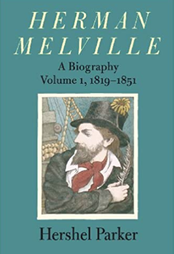A WRITER'S WIT |
Sorry! This post should have come out yesterday, but due to a scheduling error on my part it did not happen!
My Book World

The chapters and passages concerning the works of Melville—how he researches, how he drafts (his sister is his official copyist), and how he approaches getting published—are entirely engrossing. As a young man of twenty or so, Melville spends more than a year in the South Pacific. From this expedition he mines much material for his first three books: Typee, Omoo, and Mardi. One thing that is difficult to believe is that the American press (with highly opinionated and not always qualified critics) question the veracity of his work. Does he really travel to those places, or does he use resource material to “pad” his work? The British press are kinder to him, but it seems that he is always struggling to pacify the whole lot of them. At the same time, he does attract enough positive attention to continue writing. One must realize that Melville, as well as his friend, Nathaniel Hawthorne, never made much money during their lifetimes. Melville was always begging or borrowing or dealing to keep his family with an income. Would that the poor man had lived to see his place in literary history or to reap the monetary rewards from his brilliant labors!
Though it sold barely 3,000 copies in his lifetime, Moby Dick is the novel for which Melville is most remembered. Here, Parker waxes romantic about his subject (and deservedly so): “The river of Melville’s reading had long flowed into his conscious mind (indeed, it had overflowed there in the more bookish parts of Mardi). Now his profounder reading not only flowed on the surface but was partly diverted into a subterranean river that flowed into the spring of original thought, a spring ready to burst out, under the pressure of the occasion and the time, into Moby-Dick, once the interminable voyage was over” (701).
Parker’s Volume I concludes with an extended scene in which Melville presents a copy of Moby Dick to Nathaniel Hawthorne so that the man can see that Melville has dedicated the tome to his dear friend and mentor. “Take it all in all, this was the happiest day of Melville’s life” (883). I plan to read Volume II, but I may give it some time!



 RSS Feed
RSS Feed